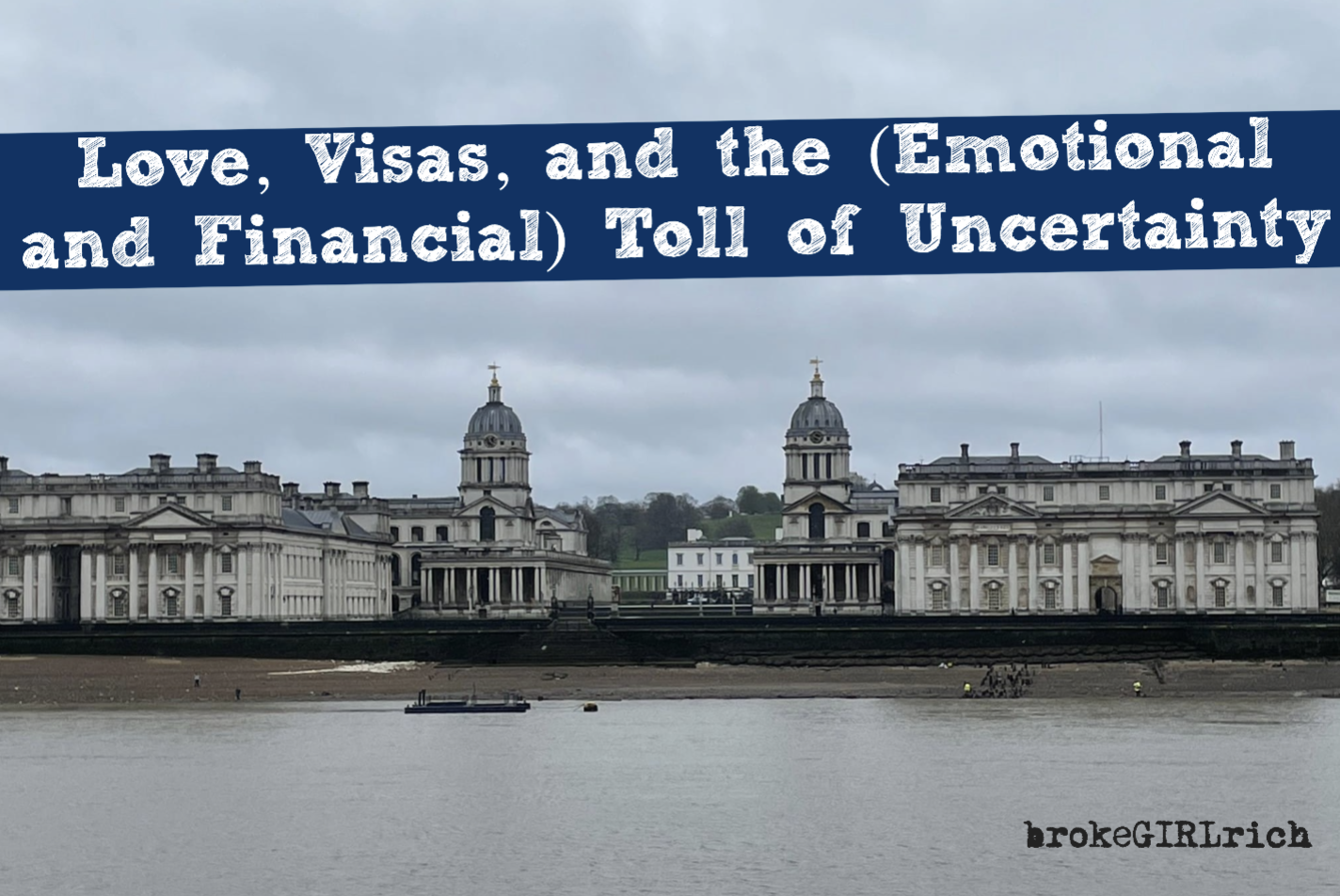
Love, Visas, and the (Emotional and Financial) Toll of Uncertainty | brokeGIRLrich
When I moved to the UK for my PhD, I imagined the usual academic challenges: the late nights with library books, the conference paper nerves, the precarious funding hustle. What I didn’t anticipate was meeting a weird, nerdy guy who makes life a lot better with him than without him – and how much that would complicate my life after graduation.
Now, with just under a year left in my program, my attention has shifted a little from footnotes and interviews to immigration law, post-study work options, and the exhausting uncertainty that is familiar to anyone trying to build a life abroad.
The UK’s most recent immigration white paper, published in May 2025, threw another wrench into the works. Tucked into Chapter 3, “Skilled Students,” was a familiar mix of praise and suspicion. International students, we’re told, are essential to the UK economy. We inject billions into higher education and local communities. And yet… there’s growing concern that we’re not “contributing enough” after graduation. Not working in the “right” kinds of jobs. Not always attending the “top” institutions. And maybe overstaying our welcome.
It’s hard not to start panicking a bit when reading that.
When Love Changes the Exit Strategy
Before I met my partner, I assumed I’d return to the U.S. after finishing my degree. One of my dream jobs is teaching at a little university deep in the woods of New Jersey, closer to home. But life had other plans. I met someone.
And now, it’s a lot harder to leave.
So, after a lot of negotiating, I began planning to stay under the UK’s Graduate Route visa, which allows international students to remain for two (or three, for PhDs) years after graduation to work or look for work. For me, this made sense. It would give me time to find my feet professionally and let my partner and me figure out the logistics of our life together. I have been way more of a vagabond than him and this compromise includes the plan of then moving to the U.S. after those three years. I also work in the arts and there are some really interesting work opportunities here but they are largely self-employed – jobs I can’t do on the student visa but could on the graduate one. And they are in an industry with a worker shortage at the moment, so I wouldn’t even be taking a job from a British person. Anyway, while I don’t 100% love this plan, I can live with it and I do love the boy, so here we are.
What’s the RQF—and Why Does It Matter?
The immigration white paper highlights concerns about international graduates taking jobs “beneath their skill level,” a coded reference to the Regulated Qualifications Framework (RQF). The UK uses this framework to categorize educational attainment. A bachelor’s degree is RQF Level 6. A master’s is Level 7. A PhD, like mine, is Level 8.
The worry is that too many international grads are taking jobs below RQF Level 6. But here’s the thing: jobs aren’t handed out neatly labeled by RQF level. Academia is oversaturated. Entry-level research posts are scarce. And while I may have an RQF Level 8 qualification, I may still need to work in communications, project management, or even part-time work as I find my footing. That doesn’t mean I’m underqualified or misusing the system. It means I’m surviving, like everyone else. I don’t even really believe this paper remotely understands the complexities of working (and teaching, even at university level) in the arts. I imagine many others in many different fields feel the same.
And yet, the implication is clear: if we’re not climbing the “right” career ladder fast enough, our presence here becomes suspect.
The Financial Reality of Staying
There’s a myth that international students are well-off. While some are, many of us juggle research, teaching, and part-time jobs to make ends meet. I currently work under my Tier 4 visa (now formally called the Student Route), which permits up to 20 hours a week during term and full-time during breaks. Every hour is scheduled around my studies and the need to save. Trips back to the U.S. are often crammed with as much side-work as I can squeeze in too.
Applying for the Graduate Route costs over £800, not including the annual Immigration Health Surcharge (£1,035 per year). That’s before accounting for rent, bills, and the reality of living in cities like London. For couples like us, marriage isn’t just a romantic decision, it’s likely an eventual legal and financial strategy. But marriage brings its own fees, visa categories, and eligibility requirements. None of this is simple. None of it is free.
When Policy Feels Personal
The most frustrating part of this process is the way immigration policy reduces lives to bullet points. I’m a PhD researcher. I’m a partner. I’m a contributing member of my community. But to the Home Office, I’m just another line in the data. I get lumped into metrics about “students abusing the system” or “graduates not finding skilled work.” It’s kind dehumanizing.
I was also really fond of their concerns that because I’m not studying somewhere like Cambridge, Oxford or LSE that my education is subpar. I’m finishing my PhD at a university that isn’t in the top 100 global rankings (though it is #63 in country), but my research is rigorous, my supervisors are leaders in the field, and I’ve spent years pouring myself into this work. The idea that my contribution might be dismissed or devalued because of where I study or where I start working after graduation is…frankly, infuriating. I specifically picked this university because during my interview one of the professors said “we study the strange things no one else wants to let you study here” and that has been a true and brilliant thing about the University of Greenwich School of Stage and Screen.
We shouldn’t have to plan our lives around government white papers. But here we are.
What Can Be Done?
First, we need nuance. Not every international graduate is going to walk straight into a high-paying job and that’s okay. Honestly, a significant number of PhD students do want to work in academia and it is a weird, hard road with a fair bit of part-time, contract based worked at first to get there. The U.S. is no different here. There needs to be some consideration of this. The value of international students isn’t just economic; it’s human. We bring ideas, languages, perspectives. We fall in love. We build lives here. That matters too.
Second, we need more transparency and less reactionary policymaking. Students make enormous financial and emotional investments to study in the UK. We contribute £20.65 billion to the economy annually. We deserve stability, not shifting goalposts.
And finally, we need to tell our stories. It’s easy to demonize “foreigners” in a spreadsheet. It’s harder to dismiss a friend, a colleague, a partner. If you’re an international student, a recent grad, or someone in a cross-cultural relationship: your story matters. Share it. Let people see the human side of immigration policy.
Because at the end of the day, we’re not just statistics. Also, this won’t be my only post on this. That white paper changes every kind of visa, not just for students. As we learn more, I’ll be sharing it here.
The post Love, Visas, and the (Emotional and Financial) Toll of Uncertainty appeared first on brokeGIRLrich.













 Bengali (Bangladesh) ·
Bengali (Bangladesh) ·  English (United States) ·
English (United States) ·